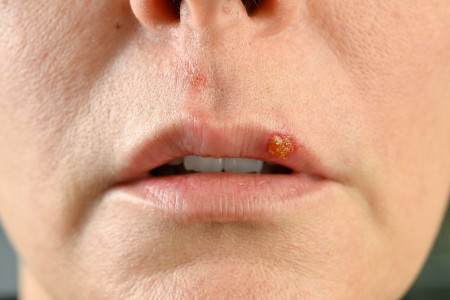Cold sores Kōmaoa
Cold sores are small blisters on your lip or around your mouth. They are caused by the herpes simplex virus. Cold sores are also known as facial herpes and fever blisters.
Causes of cold sores
Cold sores are caused by certain strains of the herpes simplex virus. If you get the virus it stays in your system for the rest of your life. It hides in your nerve cells and can become active again.
After the initial infection, most people do not get cold sores again, or they only get a few. Some people get them often.
They are spread through person to person contact with someone who has the virus. For example, through kissing, or sharing items like utensils or lip balms.
Symptoms of cold sores
Cold sores often start with a tingling, itching or burning sensation around your mouth.
Small fluid-filled blisters then appear. These are usually on the edges of your lip, but can happen on the nose or other parts of the face.
Eventually the blisters will break open and form a crust. This can take up to a couple of weeks to heal.
Diagnosing cold sores
You can diagnose a cold sore based on how it looks and feels. If you are not sure you can make an appointment with your healthcare provider.

Treating cold sores
Cold sores usually go away by themselves in 7 to 10 days without treatment.
A cold compress can help with pain and swelling. Gently press an ice cube wrapped in a tea towel or a cold washcloth to the sore for a few minutes. Rest and take pain relief if the cold sore is painful.
Try not to touch your cold sore as it can spread the virus to other parts of your body or to other people.
If you start using it early enough, an antiviral cream containing aciclovir may make a cold sore go away faster. You can buy these under a range of brand names at pharmacies without a prescription. You can also get a prescription from your healthcare provider.
Antiviral tablets may be used for severe cold sores.
Preventing cold sores
You can reduce your changes of getting another cold sore by:
- using a lip balm with SPF 30 to protect your lips from the sun
- keeping the area around your mouth clean and moisturised
- managing stress as it can reactivate the virus that caused the cold sore
- getting enough sleep — this improves your immune system's ability to fight viruses and other germs.
If you get a lot of cold sores, talk to your healthcare provider about taking antiviral tablets daily. This can help prevent future cold sores.